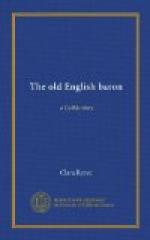“Enough,” said Sir Philip, “I am satisfied that you will. I purpose to reside myself in that very apartment which my dear friend your father inhabited; I will tread in his footsteps, and think he sees me acting his part in his son’s family. I will be attended by my own servants; and, whenever you desire it, I will give you my company; your joys, your griefs shall be mine; I shall hold your children in my arms, and their prattle shall amuse my old age; and, as my last earthly wish, your hands shall close my eyes.”
“Long, very long,” said Edmund, with eyes and hands lifted up, “may it be ere I perform so sad a duty!”
“Long and happily may you live together!” said the Baron; “I will hope to see you sometimes, and to claim a share in your blessings. But let us give no more tears to sorrow, the rest shall be those of joy and transport. The first step we take shall be to marry our Edmund; I will give orders for the celebration, and they shall be the last orders I shall give in this house.” They then separated, and went to prepare for the approaching solemnity.
Sir Philip and the Baron had a private conference concerning Edmund’s assuming the name and title of Lovel. “I am resolved,” said Sir Philip, “to go to the king; to acquaint him briefly with Edmund’s history; I will request that he may be called up to parliament by a writ, for there is no need of a new patent, he being the true inheritor; in the mean time he shall assume the name, arms, and title, and I will answer any one that shall dispute his right to them.[”] Sir Philip then declared his resolution to set out with the Baron at his departure, and to settle all his other affairs before he returned to take up his residence at the Castle.
A few days after, the marriage was celebrated, to the entire satisfaction of all parties. The Baron ordered the doors to be thrown open, and the house free for all comers; with every other token of joy and festivity. Edmund appeared full of joy without levity, of mirth without extravagance; he received the congratulations of his friends, with ease, freedom, and vivacity. He sent for his foster father and mother, who began to think themselves neglected, as he had been so deeply engaged in affairs of more consequence that he had not been particularly attentive to them; he made them come into the great hall, and presented them to his lady.
“These,” said he, “are the good people to whom I am, under God, indebted for my present happiness; they were my first benefactors; I was obliged to them for food and sustenance in my childhood, and this good woman nourished my infancy at her own breast.” The lady received them graciously, and saluted Margery. Andrew kneeled down, and, with great humility, begged Edmund’s pardon for his treatment of him in his childhood. “I heartily forgive you,” said he, “and I will excuse you to yourself; it was natural for you to look upon me as an intruder that was eating your children’s bread; you saved




